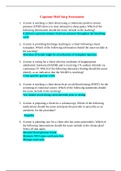Lecture notes
MGMT 310 Chapter 3 Notes
- Module
- MGMT 310
- Institution
- Virginia Commonwealth University
This is a comprehensive and detailed note on Chapter 3;ethics and corporate social responsibility for MGMT 310. *Essential Study Material!! *For you, at a price that's fair enough!!!
[Show more]









